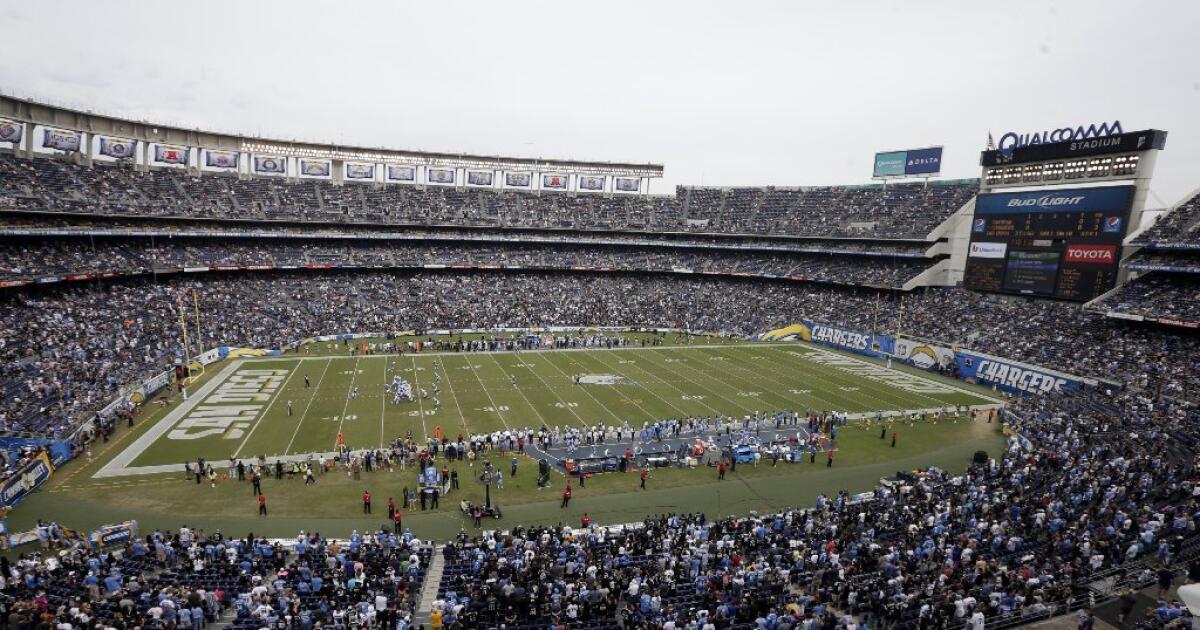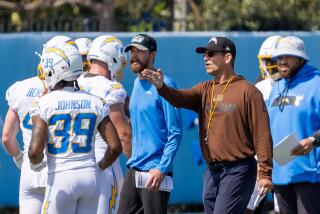Chargers won’t play in Los Angeles in 2016

The Chargers will play the 2016 season in San Diego at Qualcomm Stadium.
- Share via
In another twist to their long flirtation with Los Angeles, the San Diego Chargers announced Friday they will not move here for the 2016 season and will redouble their efforts to reach a deal to remain in their hometown.
Chargers Chairman Dean Spanos, disclosing his decision in an open letter to Chargers fans, said the team still had an agreement with the Rams to share their stadium in Inglewood, “but my focus is on San Diego.”
“This has been our home for 55 years, and I want to keep the team here and provide the world-class stadium experience you deserve,” Spanos said.
See the most-read stories in Sports this hour>>
The announcement means Los Angeles will have one NFL team when the season opens this year. The Rams are expected to play the first three seasons in the Coliseum while a stadium is being built in Inglewood.
The Chargers have until Jan. 15, 2017, to exercise a one-year option to move to L.A. The team can ask for the option to be extended one year if San Diego voters approve public financing for a stadium there. Should the Chargers remain in San Diego, the Oakland Raiders have the right to share the Inglewood stadium.
Spanos informed San Diego Mayor Kevin Faulconer and County Supervisor Ron Roberts of his decision during a half-hour meeting Friday afternoon.
“We appreciate Mr. Spanos’ commitment to staying in San Diego for the 2016 season to work with the region on a stadium solution,” Faulconer and Roberts said in a joint statement. “We … will be working with him and our negotiating team on a fair and viable plan to put before voters.”
Spanos echoed that sentiment: “I am committed to looking at this with a fresh perspective and new sense of possibility.”
San Diego has pushed to put a stadium initiative on the ballot this year to approve public money to go toward a $1.1-billion stadium at a Mission Valley site near the Chargers’ current stadium.
The Chargers had previously expressed concerns that voters wouldn’t approve such a measure and that the city rushed an environmental impact report for the proposed project.
NFL Commissioner Roger Goodell said he is “very supportive” of the Chargers’ decision.
“We look forward to partnering with the Chargers in Inglewood, but the decision, of course, is Dean’s to make,” said Rams owner Stan Kroenke.
When NFL owners green-lighted the Rams to move to L.A. and build a stadium in Inglewood this month, they also provided incentives to the Chargers and Raiders to pursue stadiums in their home markets. The teams backed a rival stadium project in Carson for the last year, but the effort didn’t attract widespread support among owners.
As a consolation prize, owners pledged $100 million to each team toward new stadiums in their current cities. It’s unclear whether the money would be a loan.
The Chargers would also be able to use a $200-million construction loan from the league toward a new stadium.
Spanos has another reason to try to remain in San Diego. Moving to L.A. would require the Chargers to pay a $550-million relocation fee to the league starting in 2019. The payments could be spread over 10 years.
The Chargers are developing plans for a five-acre training facility in Santa Ana in case of an eventual move to L.A.
Earlier Friday, the team reached an agreement in principle with the Rams to share the Inglewood stadium. The deal would leave the Chargers as a tenant paying $1 per year in rent, with the team’s $200-million loan from the NFL and revenue from the sale of personal seat licenses being used to offset construction costs for the stadium.
The stadium, scheduled to open for the 2019 season, is expected to be the most expensive in U.S. history.
A second team would also be a boon for a surrounding development bankrolled by Kroenke. It would provide more visitors to what is envisioned as a sports and entertainment hub on a 298-acre site that will include shopping, office space and housing.
The Chargers had expressed reservations about the Inglewood stadium, including the venue’s roof, artificial turf and location.
Now they will return to talks in San Diego — with L.A. still one decision away.
Follow Nathan Fenno on Twitter @nathanfenno
Follow Sam Farmer on Twitter @LATimesFarmer
ALSO
O.C jail escapee surrenders with plea to a friend: Call police
Are we getting closer to understanding where the moon actually came from?
Japan imposes a negative interest rate: What that means for them and us
More to Read
Go beyond the scoreboard
Get the latest on L.A.'s teams in the daily Sports Report newsletter.
You may occasionally receive promotional content from the Los Angeles Times.












